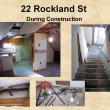Rockland’s rental housing needs upgrades, says former economic development director
ROCKLAND — More than 10 years ago, Rodney Lynch visited a home in Rockland at the request of the city's code enforcement officer. That code officer approached him out of desperation, hoping Lynch could help direct funds toward a house on the verge of being condemned despite occupants who paid the monthly rent, and who had no place else to go.
Conditions were deplorable, recounted Lynch. Adding to the situation was the fact that the occupants were disabled, likely surviving on limited social security or other disability income, and could not afford home repairs.
But thanks to grants attained by Lynch, through his role as Rockland’s economic and community development director, the house, along with several other occupancies in Rockland, was at least made livable. Code improvements and other upgrades allowed the occupants to continue residing within instead of facing eviction.
Four years after completion of the last Rockland low-income rehabilitation project using community grants, Lynch is calling for the City to make housing a priority again. His statement comes shortly after the resignation of Rockland’s city manager, who had shifted the role of community development director to include duties of assistant city manager as well.
"Restoring the job of Director of the Economic and Community Development Department to a full-time position would allow for more city staff resources to be devoted to addressing the problems associated with the city's aging and, at times, neglected multi-family housing stock.”
“With the departure of City Manager Chaousis now is the opportune time for the City Council to restore the director's position to a full-time position with a priority focus on dealing with the city's existing housing supply,” said Lynch, who served as the city’s Community Development Director from 1998 to 2011.
Rockland's housing is old, Lynch said. It is both financially and physically difficult for property owners and contractors to bring apartment buildings and single family homes up to current building, life safety, plumbing, and electrical codes, as well as making them more energy efficient.
"I would like to see them brought up to code and made more energy efficient,” said Lynch, in a recent conversation about the Rockland housing stock. “Because bringing buildings up to code is expensive, there is still a role for the city to play in assisting and leveraging the CDBG multi-family rehabilitation loan repayments to the city and the CDBG Housing Assistance and Home Repair Network Programs that are sponsored by the Maine Department of Economic and Community Development,” said Lynch
He also cited other grants and loan programs as incentives for property owners to undertake these upgrades and improvements.
"The need is very much out there," he said of the housing rehabilitation project program he helped to create over a decade ago.
That program was the result of Lynch getting three community development block grants for the city, totaling $850,000 in funding for Rockland to better its housing stock.
The goal was to provided subsidies to Rockland landlords whose rental buildings weren't up to code. Their buildings had been determined by the city's code enforcement officer and Assistant Fire Chief to be unsafe and not meeting fire and safety standards.
Of that, $738,000 went to property owners in loans and grants and resulted in the substantial rehabilitation of 10 city-wide apartment buildings consisting of 57 units, according to Lynch.
Renovations took place on Summer, Pleasant, Warren, Masonic, Main, Chestnut, Rockland, Brewster, and two on North Main streets.
Mentioned specifically are 22 Rockland, 52 Pleasant, 49 Brewster, 30 Chestnut, 83/87 North Main,15 Summer, 28 Warren, 204 Main, 22 Masonic and 6 Broad streets.
Grant stipulations required landlords to put down a 10 percent match, and pay back only half the loan to the city after five years time. The other half of the loan was paid by the housing grants as a forgivable loan.
Lynch would like to see the city actively pursue such a multi-family and single-family rehabilitation program again with the help of CDBG and other housing programs.
“Looking back on it now, we made a dent,” Lynch said. “I’m not going to claim wholehearted success because there’s still a lot to be done,” he said.
The Penobscot Bay Pilot reached out to Economic and Community Development Director/Assistant City Manager Audra Caler-Bell and the five members of city council for responses to Lynch’s statement regarding returning the role of community development director to full time, as well as making housing rehabilitation a priority. Caler-Bell and Council Member William Clayton responded.
While both were appreciative of the issues concerning aging and low-income housing, their perspectives differed from that of Lynch.
Current Economic and Community Development Director/Assistant City Manager Audra Caler-Bell said, in an email: “I agree that increasing resources to address the housing crisis in our region will be helpful. However it's overly simplistic to claim the only way to do this is through the City of Rockland contributing more staff resources.
“While the City of Rockland has an important role to play in addressing the housing shortage in our region, this is a complex issue. In order to address it sustainably it will require true partnerships and resources from other local governments in Knox County, the state government, federal government, and private and not-for-profit sectors. We could have a team of staff working on this full time but a single city simply does not have the ability to correct a regional market failure on our own.
“In addition City Council recognized Rockland's need to contribute more resources to Community Development/Planning through allocating additional funding to the department in the FY17 budget. There are a variety of ways to use these resources to address the housing crisis. Increased staffing is one way but it certainly is not the only way."
Councilor Clayton also offered his thoughts, in an email: “I have known Rodney since my first year serving as councilor and I respect him tremendously. He has the history of the city and its various economic development projects both that have succeeded and those that have had learning curves. I have also gotten to know Audra and have the utmost respect for her as well.
“Audra has the finger on the pulse of what is happening in the state and within other communities which helps the city immediately. Between the two of them, Rockland has been in good hands for quite some time but this has gone mostly unnoticed and needs to be reported.
“Now, regarding the housing stock, I am not in favor of looking at adding any more low-income or subsidized housing developments. I will always listen to any proposal, of course, but it would need to be a completely overwhelming reasoning of location, size and funding sources to gain my support. The multi-family housing stock does need to be addressed and rehabilitated as many old beautiful houses have been cut up and made into as many apartments as possible over the decades.
“I believe the key is looking to attract as many people in the middle class work force as possible create a fully diversified balance of residents. To do this we need to enhance and even create housing stock they are interested in so they choose to live here and not simply commute to work here. Higher end condos, single family homes and even large apartments are key.
“We have a great city, highly walkable and commutable, other than personal vehicles, and that is a tremendous plus for us. Just look at what has been happening downtown in the upper portions of buildings and transforming them into living spaces. That is incredible to see and have especially since the economic downturn. The highly blank canvas we have in Tillson Avenue is something I can’t wait to see develop over the next decade.
“Regarding the position of Audra as Community Development Director and Assistant City Manager, I am fully in support as it currently stands. Audra has shown tremendous poise and strength in this and through everything else that has transpired over the last six months politically and she has my support.
“Personally I will leave it to the next City Manager to open a discussion with council as they see the position. And I would encourage as much dialog as possible from council, staff and residents.”
Reach Sarah Thompson at news@penbaypilot.com.
























































